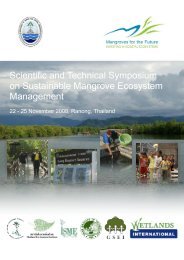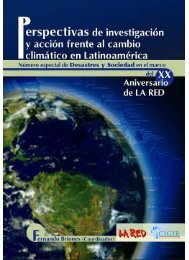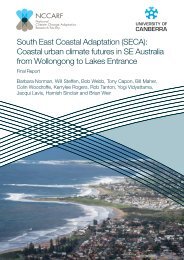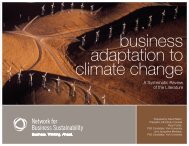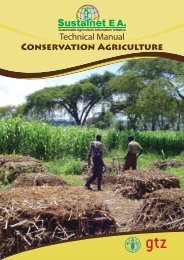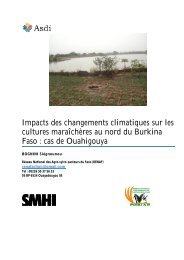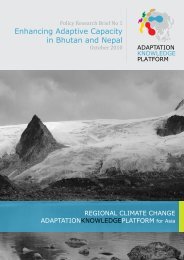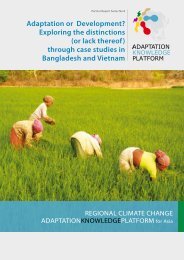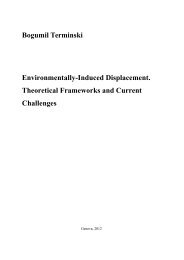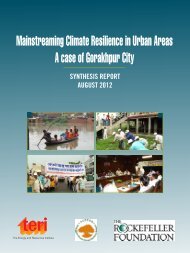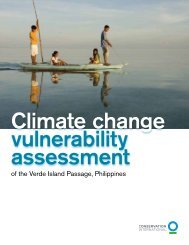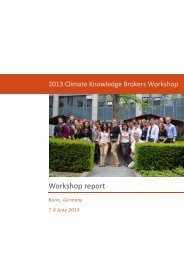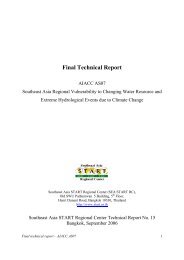Urban food security, urban resilience and climate change - weADAPT
Urban food security, urban resilience and climate change - weADAPT
Urban food security, urban resilience and climate change - weADAPT
Create successful ePaper yourself
Turn your PDF publications into a flip-book with our unique Google optimized e-Paper software.
Another issue that was mentioned by almost all interviewees in the inner <strong>urban</strong> contextwas soil contamination. The widespread perception, substantiated by testing carriedout in several areas, is that most of inner <strong>urban</strong> areas of Melbourne has soilcontaminated with lead <strong>and</strong> other toxins used in industrial processes, <strong>and</strong> in lead paintsthat were common in the first half of the 20 th century:It was a big issue with this house, because the side wall on the adjoining propertywas painted with lead paint, <strong>and</strong> we spent a long time negotiating with [ourneighbours] to do something about it, <strong>and</strong> eventually had to get council involved.The paint was flaking off <strong>and</strong> we found it all through our soil. The neighbourshave now capped the wall with a vinyl covering. We couldn’t do anything untilthey’d done that, <strong>and</strong> then we had really serious lead contamination.It’s such a big issue, there’s so many gardeners growing vegies under paintwalls, <strong>and</strong> I’ve done it myself, before I became aware. We need much greaterawareness <strong>and</strong> research about this. You pretty much have to assume that you’vegot contaminated soil, <strong>and</strong> that’s most of inner Melbourne – but that’s wherewe’re at [Backyard gardener <strong>and</strong> permaculturalist, Melbourne].As discussed below, there are ways of addressing this issue, but at the moment theyfall on each individuals’ shoulders in the case of backyard gardeners; <strong>and</strong> oncommunity <strong>and</strong> school groups, as regards community <strong>and</strong> school gardens. Soil testingis expensive, <strong>and</strong> building up raised beds is a further, sometimes considerable,expense.Another barrier identified was the emergence in recent years of a backlash againstcommunity gardening in public parks in the form of a growing ‘open space’ lobby,whose members see community gardening in public spaces as a form of appropriatingpublic l<strong>and</strong> for essentially private use.To illustrate these challenges, we offer a short case study of an attempt to set up acommunity garden <strong>and</strong> describe some of the barriers in practice faced by a group oflocal enthusiasts, even in an environment where support was forthcoming, in principle,from local government.As part of its promotion of ‘an active <strong>and</strong> healthy community’, Gold Coast City Councilpromotes community gardens as a way of increasing <strong>food</strong> <strong>security</strong> in the city <strong>and</strong> hasprepared a Community Gardens Start Up Kit for groups wanting to develop such a localinitiative. Linked to this process of support, the Council appointed a dedicated worker toliaise with local groups planning a community garden <strong>and</strong> a number of DivisionalCouncillors allocated funds from their Divisional budgets to support initiatives in theircommunities.One such group formed after their Divisional Councillor called a public meeting topromote the idea of a community garden in the Division. They were pleased to learnthat ‘all we had to do was form a steering group <strong>and</strong> get 14 members signed up’, whichthey achieved quickly. However, they then discovered that they would either have tobecome an incorporated body or exist under the auspices of a relevant existing body,such as a large community based, not-for-profit organisation. As the auspicing optionseemed most convenient, they then approached a large national organisation with asignificant presence on the Gold Coast, who agreed to act in this capacity. They thenlearned that this body was deemed by the Council not to be primarily concerned with<strong>Urban</strong> <strong>food</strong> <strong>security</strong>, <strong>urban</strong> <strong>resilience</strong> <strong>and</strong> <strong>climate</strong> <strong>change</strong> 139



